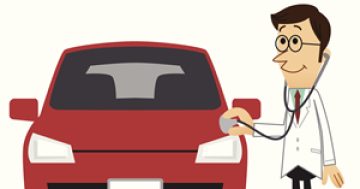By Paul Gover.
 Q: After having my son recently doored by an inattentive driver whilst riding his bicycle, I wondered why manufacturers haven’t or won’t use blind spot monitoring to lock the driver’s door when a cyclist is approaching.
Q: After having my son recently doored by an inattentive driver whilst riding his bicycle, I wondered why manufacturers haven’t or won’t use blind spot monitoring to lock the driver’s door when a cyclist is approaching.
With all the tech currently built in and available, I don’t see why this hasn’t been implemented. It would be easy enough to do through the car’s on-board software.
It’s not as if it would draw too much power from the car’s battery and could be shut down completely after a set period.
Your thoughts?
Ross F
A: Some people want cars, not drives, to take responsibility for everything that happens on the road. There is at least one carmaker using a system as you suggest, but would the majority – and owners – be prepared to to pay extra for something that would make such a tiny difference? It would obviously have helped your son, and his crash should never be dismissed, but there is unlikely to be any change until it becomes essential for successful ANCAP safety testing.
Q: There’s been a lot of discussion about EVs and their range when brand new, but I haven’t heard much about battery charge degradation and the resulting range reduction.
A 500-kilometres range when brand-new might sound OK but, as the battery ages, the range will decrease.
When I refuel my car I know the range is the same as it was last time so I’ll be staying with the combustion engine.
Dave
Q: No-one knows – yet – how range will drop over time. We’re far too early into the lifecycle of electric cars. There will be drop-off, just as combustion engines use more fuel if they are not tuned and maintained properly, but it’s going to be at least 10 years before we get a big enough sample to answer your question. Sticking with what you have, and know, is the conservative decision.
Q: When are hydrogen cars going to be coming to Australia?
Louis S
A: Hydrogen cars are a long way into the future. Hyundai and Toyota both have evaluation cars in Australia now, but not for sale to the general public. The big challenges are creating enough hydrogen, then finding a way to distribute it through something similar to existing petrol stations. Lots of questions to be answered, with no answers yet.
Q: I was wondering if you could shed some light on whether imported cars are the same as the Australian market.
I saw some used cars – Toyota Hiace, Hyundai iLoad and LDV vans– but found out they are imported models.
Does this pose a problem for servicing safety and spare parts?
I also realised they don’t export the log book service so that raises suspicion.
Jacob G
A: The so-called ‘grey imports’ look good for purchase price, but can cause problems if the specification is not – exactly – identical to local deliveries. There will also be now warranty. This has been a problem since the 1980s and it’s still a case of ‘buyer beware’ with plenty of homework needed.
Q: My 31-year-old nephew borrowed my 2019 Hyundai Accent for a few days and has expressed concerns regarding the headlights and the minimal amount of distance they cover while driving at night – even on high beam.
I’m 70 years old and rarely drive at night – but this does concern me greatly – considering I live in Ballarat and there are times I travel to Melbourne.
As the car is still under warranty – is this a matter Hyundai would be responsible for?
Cathy H
A: Lots of modern headlights under-perform, as carmakers move to LED systems which are great. In the case of your Accent, there will be better-quality and higher-output bulbs which will be a plug-and-play conversion with huge benefits. Even if you’re only a rare after-dark driver you will appreciate the improvement.
Q: I recently purchased a Hyundai Staria iLoad having had the two previous models.
I live in Melbourne but own a business in Bairnsdale so drive between the two in my van and most often on the road at night.
I was absolutely staggered at how poor the standard headlights are on the Staria. I describe them as dangerous.
I didn’t drive the car at night, incorrectly assumed lighting would be no worse than the previous models which had been fine.
They use a new halogen glove a H 19 and are set super low on the re-designed front end of the Staria and are small lights also.
I contacted Hyundai but got fobbed off with the line “they comply to ADR” and that was that.
There is no LED update available from anyone yet and I wonder if you have any contacts in Hyundai.
At worst, please discourage anyone who needs to drive on country roads at night from buying a Staria iLoad until Hyundai fit better headlights.
Clyde B
A: The real problems are the emphasis on design over headlight efficiency, the switch from halogen to LED, and the countries where vehicles are developed. Night vision on country roads is a huge priority in Australia, but not in South Korea. It was similar for Subaru, and Japan, in the days before LED lights came to many cars. Hyundai is right that the lights comply, and it will be impossible to make a successful case to senior management, but we’ll keep pushing for improvements.
Q: Any tips on a first car that’s safe and reliable for my daughter?
We want an auto, with a budget around $18,000.
And how many kilometres is reasonable?
Simon C
A: Right now, a Kia Cerato is an excellent choice. Use your full budget for maximum safety and the lowest kilometres, balancing one against the others. Kia is twinned to Hyundai, so the Hyundai i30 is also a smart choice.
Q: I am just wanting to know if there any hybrid utes likely to come on the market in 2023?
And rough price estimates?
Cheryl C
A: There are zero hybrid utes in the pipeline anywhere. Right now, the only factory-built electric ute is nearly $100,000. It’s from LDV and not recommended, but numbers are so low it’s only for governments and local councils. Toyota is hinting about a hybrid HiLux, but it’s unlikely before the second half of 2024.
Q: I currently drive a late-2010 all-wheel drive, 2-litre Toyota RAV4 with 147,000 kilometres and it’s the best and most reliable car I’ve ever owned.
But I’m thinking of upgrading to another used car.
I’ve heard the Hyundai and Kia are just as good as Toyotas, but my cautionary personality finds this difficult to understand as the RAVs are so much more expensive for like year and kilometres.
Do you have a preference with either of these, as I’m on my own and tow a small Jayco Penguin van and my RAV has never missed a beat while towing.
Deb B
A: There was a time when Toyota was the gold standard, but the South Koreans have run them down and provide considerably better value. The reason Toyota does so well in the secondhand scene is because there is a time lag and the parents who fund a lot of used cars still buy on the basis of their early experiences. Both Kia and Hyundai now have SUVs which are as good or better than the RAV4, unless you want a hybrid. There will be good choice and good value and Kia will be slightly better with the Seltos.
If you have a question for the Car Doctor, send an email to [email protected]



